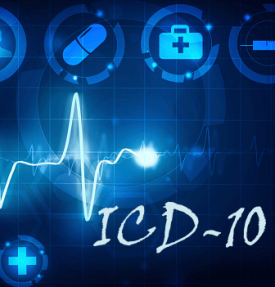Lessons Learned from the First Year of ICD-10 Implementation
A robust educational campaign enabled Baptist Health South Florida to avoid potential negative effects stemming from ICD-10 implementation.

- With the anniversary of ICD-10 compliance approaching, many providers are looking back on the past year to see how the new coding system has affected their organizations as well as preparing for fast approaching updates.

At Baptist Health South Florida, a six-hospital system and clinical care network in the Miami and Florida Keys areas, implementing the coding system had very little effect on the organization’s healthcare revenue cycle, but it did offer a major educational opportunity for providers.
Baptist Health is like many other healthcare organizations in that the ICD-10 implementation process went smoother than expected. According to a May WEDI ICD-10 Post-Implementation Survey, a majority of providers reported a smooth ICD-10 transition because of implementation delays that allowed organizations to continue training staff and test the system.
The organization was modestly affected by the transition, especially in terms of coding workflows and healthcare revenue cycle, Baptist Health Corporate Medical Director Lorena Chicoye, MD, recently told RevCycleIntelligence.com.
“For coding workflow, we had an initial decrease of approximately 40 percent,” said Chicoye. “However, we’ve been scratching and crawling our way back up to where we were prior to ICD-10. We are about at the 15 to 20 percent less coding productivity right now and we are still improving on that.”
“We had some drop off, but we are recovering,” she added.
A June AHIMA survey showed that coding productivity fell by 14 percent after ICD-10 implementation and accuracy decreased by 0.65 percent. While most providers faced a small decrease in productivity, Chicoye noted that Baptist Health experienced a greater coding workflow issue, especially since the organization had not installed an EHR at the time. But the organization quickly overcame the challenge.
Although many healthcare experts and providers warned the industry that ICD-10 would bring more claim denials and clinical documentation issues, Chicoye stated that Baptist Health has not seen any downward shifts in these areas.
“During that transition phase, we were doing both ICD-9 and ICD-10 codings to ensure that when we did go to full ICD-10 that the documentation would stand in ICD-10 and there wouldn’t be any real problem with it,” she said.
As a result, Chicoye reported that the organization did not experience many of the possible revenue cycle affects, such as more claim denials and reimbursement delays.
“We didn’t see any increase in claim denials. We’re very conscientious about making sure that when we sent out medical records, the documentation holds up and it describes exactly what happened to that patient in-house and to the highest specificity as possible,” stated Chicoye. “We haven’t had any problems with that.”
“We also haven’t had any payment delays,” she added. “When the claim drops, it’s clean and it pays. We haven’t had any issues with that.”
Chicoye attributed the organization’s success with ICD-10 implementation with Baptist Health’s interactive training. The multiple implementation days allowed Baptist Health to continue educating their providers on what ICD-10 would entail and how to use it effectively.
“Since ICD-10 kept getting delayed, we kept educating as though we were going to implement on the initial implementation date,” Chicoye related. “When ICD-10 finally became live, we actually had our providers ready, willing, and able to go with it. They were running with it.”
Baptist Health developed the educational component of ICD-10 implementation in 2011 with the help of Nuance, a clinical documentation solutions company. The company developed a clinical documentation improvement initiative, powered by the JATA Compliant Documentation Management Program, that focused on provider engagement.
The program used international medical graduates from Baptist Health’s Miami hospital as well as physicians waiting for acceptance into US residency programs and trained them in clinical documentation improvement. Since the providers were either already working under a physician or starting to work at the hospitals, they were able to share their training with physicians, nurses, and support staff.
With clinical documentation improving across the organization, Baptist Health turned to more specific ICD-10 training sessions that were tailored to the provider’s or department’s specialty.
“We went hospital by hospital, department by department, and offered training to any of the community physicians who wanted one-on-ones,” Chicoye said. “If we had orthopedic surgeons, we gave them the overview. Then, we went into charts and explained to them how this would differ from ICD-9 to ICD-10.”
Baptist Health made sure ICD-10 resources were readily available to providers, including access to code books and clinical documentation improvement specialists.
“We actually showed them the ICD-10 code books, which they had never seen before,” stated Chicoye. “Physicians don’t usually see coding books. They had never seen one before. We did show-and-tell with the physicians so they could understand that these books were available to them if they had any real interest in this. We did this face-to-face at the hospitals, and our CDIs were on the floors speaking with the doctors one-on-one whenever there were issues or questions to educate them about the ICD-10.”
The organization also had a software in place that allowed providers to learn ICD-10 at their own pace and at their own interest, Chicoye added.
Once ICD-10 went live, Chicoye and her team reinforced ICD-10 training by keeping clinical documentation improvement specialists at the hospitals and reviewing medical records.
“We never stopped educating them on ICD-10, so that they were familiar,” stated Chicoye. “But just because you’re familiar doesn’t mean you retain all that information. So, we’re still there on the floors with the physicians and we review those medical records every 24 hours to make sure that the records are documented properly and can be coded out in ICD-10.”
Despite a relatively easy ICD-10 transition, Chicoye noted that the organization did have to overcome a key challenge with educating providers. Some providers didn’t want to participate in ICD-10 training or were not available to partake.
“Once we identified those providers, we actually sat down with them one-on-one with their charts,” said Chicoye. “For those who were more difficult to reach or were less inclined to believe that this was actually occurring, we went with their charts to show them specifically what we needed to have done.”
Chicoye’s team also had to quell provider concerns about ICD-10 and reassure them that the system was about being more specific in the medical record.
“Physicians are always concerned about upcoding and that CMS would come after them if they upcoded anything or if they said anything that wasn’t true in the medical record,” Chicoye said. “We had to convince a lot of them that we’re not saying anything that you haven’t already said in the medical record, we’re just putting it in terms that CMS recognizes. With ICD-10, they want you to be as specific as you can possibly be.”
As the first year with ICD-10 comes to a close, CMS plans to update the system by adding over 5,500 new codes and ending unspecified coding flexibilities. After Oct. 1, providers risk receiving claim denials if they use unspecified codes when a more appropriate code for the healthcare encounter is available.
For Chicoye, though, ICD-10 updates are just another educational opportunity for clinical documentation improvement specialists and providers.
“There is going to be a large educational opportunity for the CDIs to get to those physicians who have been a little more difficult to reach and explain to them that those unspecified codes are no longer going to be paid,” she remarked. “With that said, it’s actually gives us a little more support in terms of getting the physicians to write in the medical record with the highest specificity as possible.”
Dig Deeper:
• Key Ways to Improve Claims Management and Reimbursement in the Healthcare Revenue Cycle
• How to Manage ICD-10 Implementation Updates, Maximize Revenue
